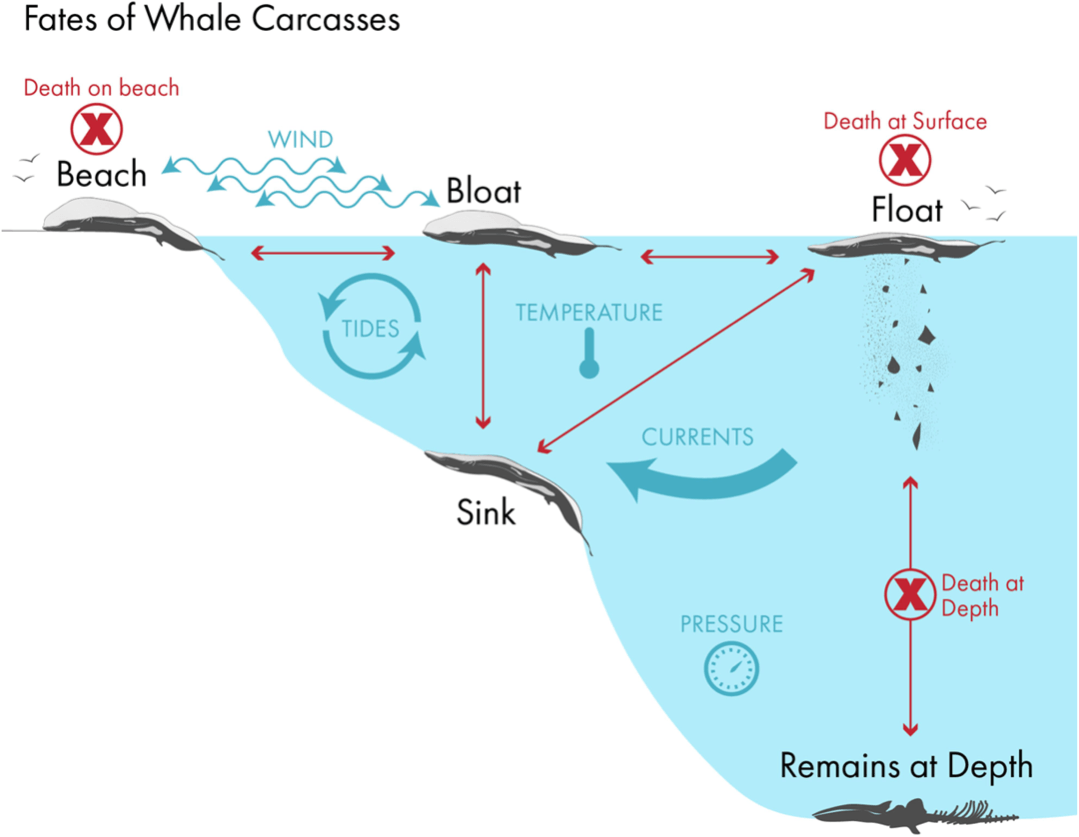What Happens After a Whale Dies?
There are many causes of whale mortality across the globe, from natural causes like acute or chronic disease, to human impacts such as vessel collision, trauma from noise pollution, fishery entanglement or toxic spills. Marine mammal scientists often face the daunting task of elucidating a complex series of events to discover the cause of death. This investigation happens in reverse order, starting with where and when an animal is found dead, to determining the possible cause of death. One major question that has remained difficult to fathom is what happens to a whale's carcass once it is deceased? Now, a new review paper looks at the possible fates of a whale carcasses.
According to a new review paper published in Frontiers in Marine Science , there a numerous possible scenarios that may lead to the investigation of a whale that has died; the animal could have died at sea and is washed ashore after some time floating along currents, or it could strand alive, where then it passes to the big "whale hotel in the sky". Sometimes it ends up ashore, and, if high enough on the strand line it may be destined to be scavenged by seabirds while it decomposes. If low on the beach, it may re-float again, it's new destination influenced by the fact it is now increasingly buoyant from decomposition gases and by the tides, currents and winds.
Many factors may influence this out-come. Only some carcasses strand, or remain floating.
Depending on the whale carcass buoyancy, the animals may float, sink and later bloat to re-float. However, this all depends on the ambient temperature and pressure which allows for the formation of decomposition gas and expansion.
Negatively buoyant animals that die at depth, or on the surface and sink, may never be observed by curious scientists. Even after the build up of decomposition gases, as in deep cold waters, where gas may not be enough to adequately reduce the carcass density and instead of washing ashore, it becomes "whale fall".
A whale that has sunken - becomes a source of nutrients for micro-organisms and other scavengers on the seabed. Concern has been raised among the scientific community that many cetacea species are more heavily impacted by human activities than are observed as they sink instead of washing ashore and stranding records can grossly underestimate the actual mortality rate at sea. Some activities have been linked to whales that have stranded, but that requires a carcass to examine. For example, military sonar has been linked to the mass strandings of beaked whales.
In dolphin populations that are well studied through long-term photo identification - researchers have shown that they have only recovered one third of known fatalities. Similarly, a study examining beached marine mammals from Cape Cod, U.S.A. showed that only 1% of small cetaceans from known by-caught animals that drowned in fishing gear washed ashore. In other areas, such as south-west England, where prevailing winds blow over fishing grounds and enable carcasses to wash ashore, up to 61% of small cetaceans with evidence of by-catch were recovered. This highlights the importance of wind direction, as in Cape Cod, the prevailing winds bring floating carcasses further out to sea.
Another study looking at the number of common dolphins that washed floated after being by-caught found that 18% were buoyant and 6% washed ashore. Some whale species such as sperm whales and right whales were historically reported by whalers to float after death, while other species such as fin and blue whales were reported to sink early in the whaling season and float at the end of the season. Humpback whales may also be prone to quickly sinking. In a study that examined a a mass mortality of 14 humpback whales that died during a 5-week period, all but one whale carcass sunk after death and that particular carcass was towed immediately after death. These were later re-floated by gas produced during decomposition.
In very deep waters (up to 2,000 meters), observations of whale carcasses indicated that at extreme depths decomposition was slow and carcasses remained stable for many years (or even decades). In one study a whale carcass in 400 m of water indicated that it had remained undisturbed for as long as 30 years. The belly-up position of the carcass seemed to indicate that at one time the carcass had been buoyed up by gas in the body cavity that likely originated from naturally occurring gut flora.
In summary of the fates of whale carcasses depend on a number of factors; including the wind, tide, current, temperature, and pressure. Depending on location at death and the buoyancy of the carcass, it may float or sink. A floating carcass will bloat, drift ashore if at sea, or eventually decompose at sea to where the negatively buoyant components sink to the ocean floor. If at death it is negatively buoyant, it will sink. If it sinks in shallow water, decomposition gas may expand sufficiently to bloat, and re-float the carcass. If the depth is too great and the water too cold, then the gas volume may not be sufficient to make it buoyant and the carcass will decompose and be scavenged on the seabed.
© Ocean Research & Conservation Ireland (O.R.C.Ireland) and www.orcireland.ie , est. 2017. If you like our blogs on the latest news in marine science and would like to support our work, visit www.orcireland.ie to become a member, to volunteer or to make a donation today. This article has been composed based on credible sources.
Reference
:
Moore, M.J., Mitchell, G.H., Rowles, T.K., Early, G., (2020). Dead Cetacean? Beach, Bloat, Float, Sink. Frontiers in Marine Science
, 7
, 333.
SHARE THIS ARTICLE














